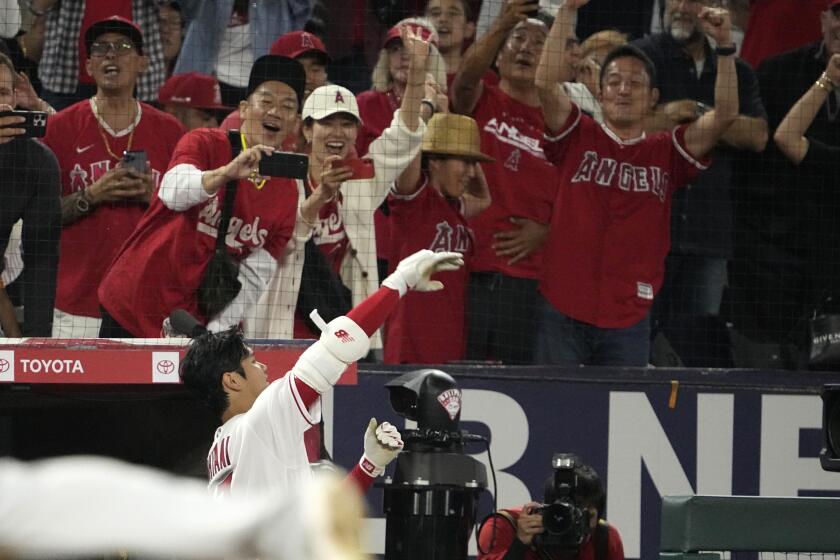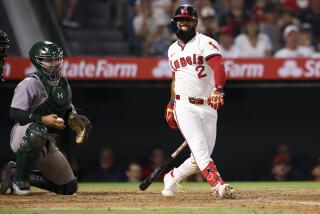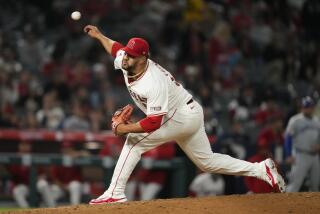Angels closer Carlos Estévez making case for All-Star selection
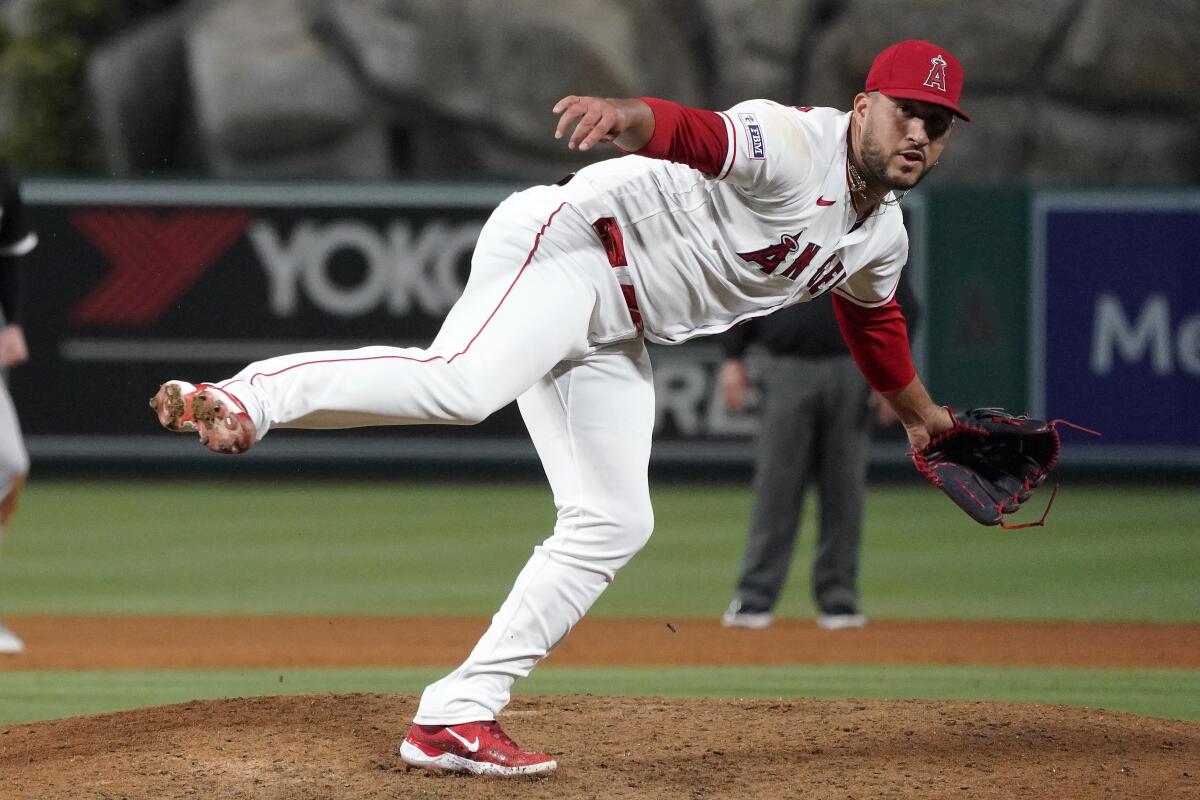
Shohei Ohtani and Mike Trout have become synonymous with the term All-Star. They’re not the only Angels players deserving this season.
Closer Carlos Estévez, over 34 appearances (33 innings), has pitched to a 1.91 ERA, with seven earned runs, eight runs, 26 hits, 16 walks and 41 strikeouts. He has an opponent batting average of .215.
Estévez, who has a 2-1 record and two holds, has also been perfect in saves, going 20 for 20 on his opportunities this season.
“I think I should be, at least, thought about, if not talked about,” Estévez said before Wednesday’s 11-5 loss to the Chicago White Sox at Angel Stadium. “Hopefully.”
Aside from setting a team record for consecutive saves when he converted save No. 20 on Tuesday against the White Sox, he is also the only reliever in the American League who is perfect with a minimum 20 saves and 30 innings pitched.
Alexis Diaz, who pitches for the Cincinnati Reds in the National League, has converted all 22 of his save opportunities over 35 games (34 innings) and is the only other closer perfect with 20 or more saves.
The Angels used to light the ‘Big A’ at Angel Stadium after victories. That’s changed. It’s time to go back to the way it used to be.
As strong of a candidate as Estévez is, his path to potential All-Star isn’t like Ohtani’s and Trout’s. Ohtani has already been voted in by fans at designated hitter, with Trout among the lead vote-getters for outfielders in Phase 2 of voting. Results for the remaining starters will be announced Thursday.
While starting position players get voted in by fan ballots, all pitchers and reserve players are selected through a combination of player ballots and the commissioner’s office.
The rule of representation at the All-Star Game also requires MLB to make sure every team is represented by at least one player. If another team’s best/most worthy player is a reliever, that might preclude Estévez from being selected. Not every player named an All-Star elects to or is able to participate, so Estévez’s other chance might be a selection as a replacement.
As far as the competition among other closers in the AL with more saves than Estévez this season:
Cleveland’s Emmanuel Clase is 24 for 29 with a 2.35 ERA, .215 opponent batting average and 35 strikeouts over 38 1/3 innings; Toronto’s Jordan Romano is 23 for 26 in saves with a 2.76 ERA, .224 average and 40 strikeouts over 32 2/3 innings; Baltimore’s Felix Bautista is 21 for 26 in saves with a 1.19 ERA, .150 average and 76 strikeouts over 37 2/3 innings.
Of those three, Clase and Romano were All-Stars last year.
After Estévez, the next three closers with the most saves are:
Boston’s Kenley Jansen, 16 for 19, 3.08 ERA, .225 average, 31 strikeouts over 26 1/3 innings; Houston’s Ryan Pressly, 15 for 18 in saves, 2.88 ERA, .200 average, 37 strikeouts over 34 1/3 innings; and Seattle’s Paul Sewald, 14 for 17 in saves, 2.84 ERA, .180 average, 42 strikeouts over 31 2/3 innings.
The full All-Star rosters will be revealed Sunday.
Angels manager Phil Nevin said last week even though he was not familiar with where Estévez stacked up, that his closer was certainly deserving of All-Star consideration.
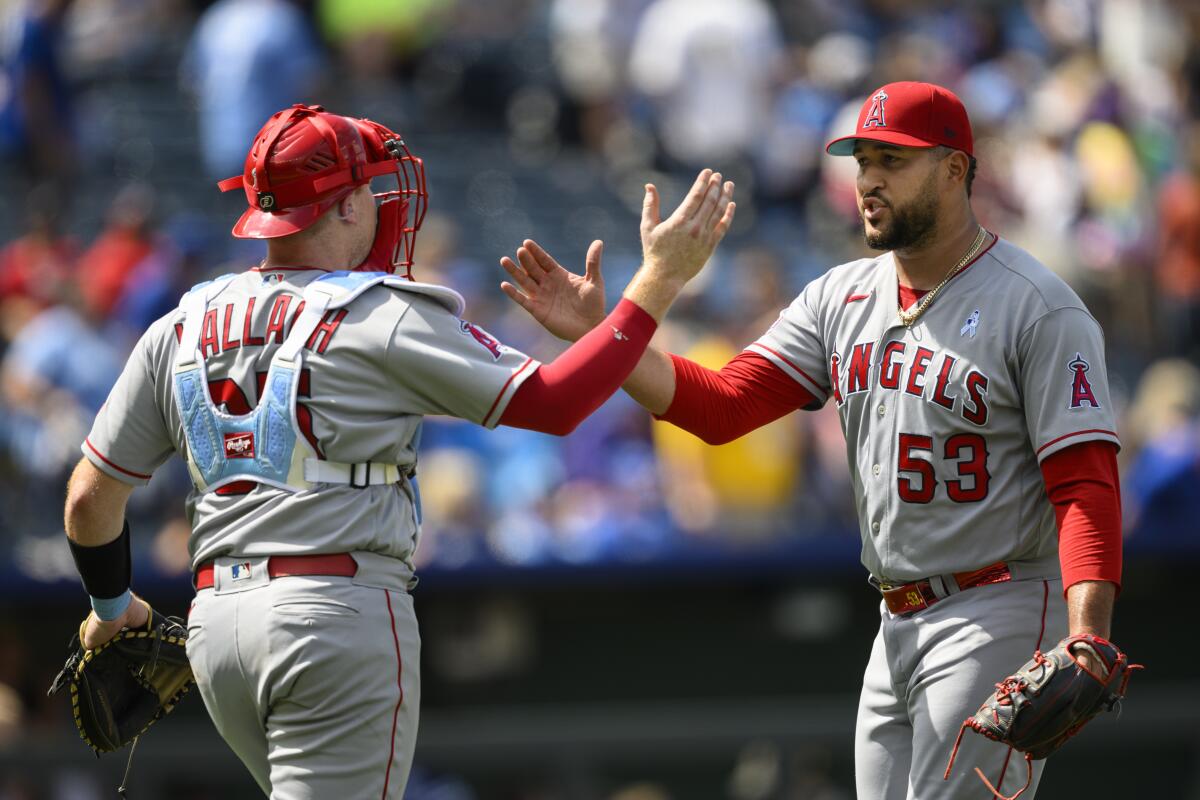
“I mean, the best closers in the game, they’re rarely 19 for 19 in saves,” Nevin said after Estévez secured his 19th save, “and I know he had a little bit of a hiccup there in Texas. For me, that was just from overuse.
“I can’t see him not being [in the All-Star Game],” Nevin continued. “I don’t know there’s anybody that’s perfect in saves so far, knock on wood. ... I don‘t know how it goes, but I’d be shocked if he wasn’t in that conversation.”
The one hiccup that Estévez had, on June 15 in Texas, was not during a save opportunity.
Estévez was pitching for the seventh time in 12 games and for the third time in the four-game series in Texas.
For the first time in a long time, he felt tired. He has had additional days of rest since then, getting saves Nos. 19 and 20 along the way.
Estévez, though, said he hoped to be an All-Star, liked his chances given his numbers and wouldn’t necessarily feel snubbed if it didn’t happen this year.
“Honestly, I never expect to be that high up like, ‘Oh, I’m gonna go to the All-Star game,’” he said. “I have a motto, don’t ever expect way too much out of anyone so you don’t get disappointed if it doesn’t happen.
“So, I’m kind of like right there. With the number that I have put up and how the team is going, I think it’ll be really good to be an All-Star.”
Estévez has played an important role in the Angels’ season (44-38 entering Thursday). The right-hander is in the middle of what is shaping up to be a career year.
Last season with the Colorado Rockies was his previous best as far as ERA.
Estévez was not the Rockies’ closer, but he finished the season with a 3.47 ERA, a 4-4 record, 13 holds and was two for six in save opportunities.
By now, fans have become distinctly familiar with the Angels’ home run celebration headpiece, a samurai warrior helmet, known as a kabuto. But how did it come to be?
Players from around the league have reached out to Estévez to congratulate him on all his success so far this season.
“Just like, ‘Man, amazing to see how you’re doing,’ ‘Good for you,’” Estévez recalled of some of the recent messages. “Yency Almonte from the Dodgers was like, ‘I’m proud of you, keep it up.’
“Even guys from the Rockies, guys that I haven’t played with, but I’ve talked to them. And that’s a good feeling.”
Angels vs. White Sox
The Angels game against the White Sox seemed to get away from them in a hurry Wednesday.
Starter Jaime Barría gave up three home runs, one in each of his three innings. His final line included five earned runs, seven hits and two walks. The first home run Barría gave up, a two-run shot by Luis Robert Jr., put the White Sox ahead 2-0.
It was also the first game Barría, the team’s spot starter, had started since June 13, though he said he did not think that had an impact on his performance on Wednesday.
“I didn’t think so,” Barría said in Spanish after the game. “I did all my necessary bullpens. I missed my pitches. All my pitches were high. It’s part of the game.”
The Angels’ offense was able to even the score in the bottom of the first, on back-to-back triples by Ohtani and Trout, followed by an RBI single by Brandon Drury.
But the White Sox pulled away. Barría was pulled for Andrew Wantz to start the fourth and he gave up a home run in the fifth. Wantz’s line included four earned runs, three hits, one walk and two strikeouts in two innings. The White Sox scored twice more in the top of the ninth with Tucker Davidson on the mound.
The Angels made noise in the later innings, Drury and Hunter Renfroe hitting solo homers in the bottom of the seventh and another RBI from Drury in the eighth. The Angels also loaded the bases in the bottom of the ninth, with two outs, but Mickey Moniak, who came into the game as a pinch-hitter, lined out to end the game.
More to Read
Go beyond the scoreboard
Get the latest on L.A.'s teams in the daily Sports Report newsletter.
You may occasionally receive promotional content from the Los Angeles Times.


